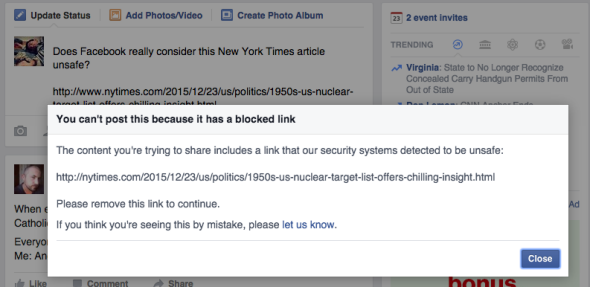Do You Know Facebook Blocked Sharing Of The New York Times Article About America’s Nuclear Targets?
Facebook on Wednesday blocked Stephen Schwartz, an atomic weapons historian when he attempted to post information about 1950s U.S. nuclear targets to Facebook. An automated message greeted him, which stated that “The content you’re trying to share includes a link that our security systems detected to be unsafe.” Schwartz who pointed out the peculiarity on Twitter wasn’t sharing state secrets, which was noticed by the Washington Post journalist Dan Zak. He was only posting a New York Times article about probable US nuclear targets in 1950.
There is no clarity as to why Facebook has blocked the story or even whether the block was algorithmic or manual. Initially, one could link the article through the Facebook widget on the New York Times’ page; however, now the same method displays a message that reads, “The server found your request confusing and isn’t sure how to proceed.” It has been pointed out by some that the mobile version of the article works, while other articles about nuclear targets have failed to generate the same issues. So what exactly is going on here, as it doesn’t appear that Facebook is actually taking issue with the article itself?
Right now, no one on @facebook can share a link to this NYT article, and all previous shares have been removed. pic.twitter.com/5JlJ8j38hz
— Stephen Schwartz (@AtomicAnalyst) December 23, 2015
Not a stranger to censorship of several kinds, Facebook is not the only company in this game. Earlier in December, Hyperallergic had reported that the Electronic Frontier Foundation has a complete site that is dedicated to observe censorship across social media platforms. Facebook itself has also interfered more directly with links. Most recently, Facebook barred all links to and discussions of a nascent social network called Tsu, probably due to the resemblance of its business model to that of a multilevel marketing scheme.
Wednesday’s incident doesn’t look like the same type of blackout as the one Facebook has coordinated against Tsu, even if the effects are similar insofar as it closes off important possibilities for conversation. The actual problem is that Facebook makes it hard to figure out what’s gone wrong and where. Users are usually told to run their problematic links through Facebook’s publicly accessible debugger when they complain about the “unsafe” link message. However, when the same is tried here, it displays yet another error message: “An internal error occurred while linking the URL.” Confused? When contacted Facebook for comment, a representative who expressed confusion, writing that the ops team was “not aware of any issue,” but promising to look into it.
Again, whatever’s going on here clearly isn’t willful censorship. However, the fact that is more troubling is the lack of transparency by Facebook. Our everyday experience is likely to be exposed to many more unpredictable oddities, as Facebook gets more powerful. The least that the company can do is to elaborate on what they mean by “unsafe.” The site is effectively infantilizing its user base without providing further details. Even if Facebook provides an explanation as to what happened with the New York Times article, the initial mystery is a strong reminder of who actually has control on our ability to share information.
Resource: Slate Blog

